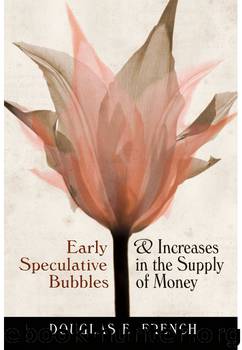Early Speculative Bubbles by Douglas E. French

Author:Douglas E. French [Douglas E. French]
Language: eng
Format: epub
Publisher: Ludwig von Mises Institute
Given modern central bankers and their respective governments’ willingness, if not eagerness, to reach for the easy-money tonic to revive an ailing economy, it is no surprise that an overindebted Britain turned to John Law’s medicine in 1720. The manifestation of Britain’s financial chicanery is known as the South Sea Bubble, which had its origins with the founding of the Bank of England in 1694, an institution that Law sought to emulate with his Royal Bank.
The South Sea Bubble 7
Late seventeenth-century England was a time of increased trade, industrial expansion, and, of course, war. All of these elements created the need, at least in the minds of the British, for a public bank. England’s close relations with Holland during this period gave the British a first-hand view of the vast Dutch economy and the important linchpin for that economy, the Bank of Amsterdam. In fact, after the founding of the Bank of Amsterdam in 1609, other public banks began to be formed: local banks at Rotterdam, Delft, and Middelburg, the Bank of Hamburg in 1619, and the Bank of Sweden in 1656. English merchants began to be exposed to public banks throughout Europe, and thus various proposals began to surface for a public bank in England.
But it was the British government that had the greatest need for a public bank. William of Orange, when he came to the throne in 1689, hoped to gain popularity by abolishing the hearth tax.1 But, needing money to fight the war against France, in addition to the civil war in Ireland and Scotland, William imposed a series of other taxes: the poll tax, stamp tax, window tax, land tax, and taxes on peddlers, hackney coaches, births, bachelors, marriages, and burials. As is inevitable, government revenue was not increased in the same proportion as the increase in the tax levies. Even had all the taxes been collected, the war expenses were far in excess of the highest revenue potential of the taxes.2
Parliament made provisions allowing tallies to be issued on future sources of government tax revenue. At first these orders were issued against the proceeds of specific taxes. But the government then began to issue against revenue in general. These tallies were made assignable and eventually the majority of this government debt was held by England’s goldsmith-bankers.
In December of 1671, Charles II was in need of funding to finance his Navy. He called upon the bankers for help, but they refused. After a debate in Council, the King decided to prohibit certain payments out of the Exchequer. His proclamation of January 5, 1672 has come to be known as the “Stop of the Exchequer.” The Stop allowed the King to pay whom he wanted, with others being out of luck. Keith Horsefield quotes two items in the proclamation that allowed for the King’s payment discretion: “all other public services and support of the government” as well as “all other payments appointed by Warrant under the Privy Seal or Royal Sign-Manual.”3 The second item enabled the King to direct payments even on stopped funds.
Download
This site does not store any files on its server. We only index and link to content provided by other sites. Please contact the content providers to delete copyright contents if any and email us, we'll remove relevant links or contents immediately.
International Integration of the Brazilian Economy by Elias C. Grivoyannis(111059)
The Radium Girls by Kate Moore(12028)
Turbulence by E. J. Noyes(8050)
Nudge - Improving Decisions about Health, Wealth, and Happiness by Thaler Sunstein(7707)
The Black Swan by Nassim Nicholas Taleb(7129)
Rich Dad Poor Dad by Robert T. Kiyosaki(6633)
Pioneering Portfolio Management by David F. Swensen(6301)
Man-made Catastrophes and Risk Information Concealment by Dmitry Chernov & Didier Sornette(6019)
Zero to One by Peter Thiel(5802)
Secrecy World by Jake Bernstein(4753)
Millionaire: The Philanderer, Gambler, and Duelist Who Invented Modern Finance by Janet Gleeson(4478)
The Age of Surveillance Capitalism by Shoshana Zuboff(4293)
Skin in the Game by Nassim Nicholas Taleb(4250)
The Money Culture by Michael Lewis(4207)
Bullshit Jobs by David Graeber(4191)
Skin in the Game: Hidden Asymmetries in Daily Life by Nassim Nicholas Taleb(4007)
The Dhandho Investor by Mohnish Pabrai(3765)
The Wisdom of Finance by Mihir Desai(3748)
Blockchain Basics by Daniel Drescher(3583)
